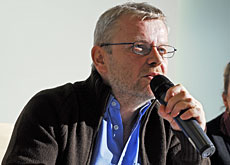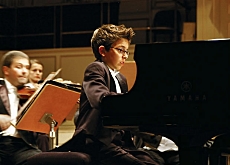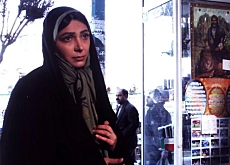“Southern Cinema” lights up Fribourg

The 21st Fribourg International Film Festival has opened, but it is the last festival for Martial Knaebel, who has been artistic director for 15 years.
Besides a retrospective on the “New Wave” from Taiwan, the programme casts a wide eye on urban life. Thirty films are in competition.
Martial Knaebel is calm. The Chadian film “Daratt” (Dry Season) has opened his final festival, which he has already proclaimed a success.
Knaebel is set to step down in June on a positive note, thanks largely to this year’s selection, of which he says he is “very proud”.
Besides the 30 films in the running for the Regard d’Or, “Southern Cinema” can be found in three sections devoted to South African and Taiwanese film, as well as in “Images of urban life”.
Feature films from Malaysia and the Philippines confirm the dynamism of Asian cinema.
swissinfo: The festival was created to highlight works by Third-World directors. Is this still the case?
Martial Knaebel: At the time [the early Eighties], the Third World movement was very present, but certain directors were somewhat offended by the label – I’ll never forget the fuss caused by Sarah Maldoror, who was from Guadeloupe, when she saw this word on the festival’s poster!
We therefore chose “Fribourg International Film Festival”. Partly because it was felt that the category “Third World” had a sort of ghetto feel to it; partly because we wanted to demonstrate that other forms of cinematic expression could enable us to understand the world in which we live.
swissinfo: The industrial model dominates cinema around the world – Bollywood is one example. Does that bother you?
M.K.: Certainly for practical reasons or because of a lack of culture one tends to look for commercial films – even Indian or Korean ones. Some distributors however continue to fight for a more intelligent distribution.
But in all these countries – as indeed in Europe – the “cinéma d’auteur” still exists. These are the works of directors who are on a “mission” to speak about their country and their culture. It is therefore particularly important that we continue to fight for them.
swissinfo: Are you following the formula of Nicolas Bideau, head of film at the Federal Culture Office, who wants Swiss cinema to be both “popular and of good quality”?
M.K.: It all depends on how you interpret it. If it means producing popular films and following a genuine policy of promotion, then I think it’s a very good initiative. If however it’s just a question of slightly improving the quality of mainstream films, I’m not at all sure whether it means anything.
swissinfo: As a rule your programme is pretty intellectual…
M.K.: I’ll take that as a compliment! Too often television dumbs down its schedules under the pretext of catering for what the public wants. If television programme makers came here, they would realise that there is a public for intelligent films.
Personally I always remember films that have a meaning and in which the directors invest a part of themselves.
swissinfo: What is your greatest memory after 15 years in charge of the festival?
M.K.: One powerful moment was when the Argentine director Fernando Solanas presented his documentary “Memory of a devastation” focusing on the years under President Menem [1989-1999]. But I cherish all friendly meetings with directors.
swissinfo-interview: Carole Wälti
The 21st Fribourg International Film Festival runs from March 18-25.
The festival was created by Swiss aid agencies in 1980, and was known at the time as the “Third World Festival”.
The idea was to present the cultural variety of Africa, Asia and Latin America at a time when there were few distributors for Third-World films.
Originally shown in church halls, the festival films made it on to cinema screens in 1986.
It became an annual festival in 1992, and in 1994 was given its current name.
Born in Strasbourg, France, in 1948, Knaebel studied chemistry at Metz University and for three years (1974-1977) travelled around East and Central Africa where he worked as a teacher and cultural organiser.
Having settled in Switzerland, he worked for various NGOs involved in Latin American and African projects.
In 1984 he started working at the Fribourg Festival as a consultant on African, Asian and Latin American films, becoming its director in 1990. Concerned about films from the Third World, he co-founded a distribution company promoting films from these countries in Switzerland.
Since 1990 he has been administrative manager of Les Films du Raphia, specialising in African documentaries, and in 1997 he was appointed expert on cinema for the Swiss Agency for Development and Cooperation (SDC).
He also sits on the Experts Board of the Montecinemaverità Foundation, dedicated to providing support for films from Asia, Latin America, Africa and Eastern Europe.

In compliance with the JTI standards
More: SWI swissinfo.ch certified by the Journalism Trust Initiative



You can find an overview of ongoing debates with our journalists here . Please join us!
If you want to start a conversation about a topic raised in this article or want to report factual errors, email us at english@swissinfo.ch.